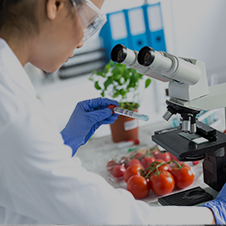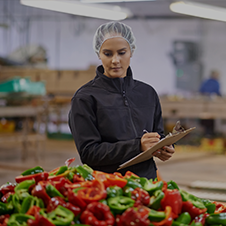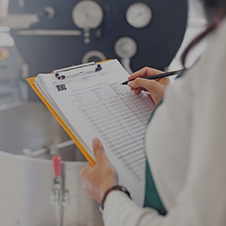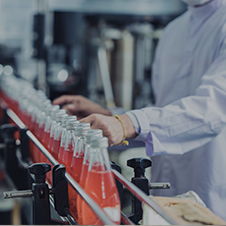Derniers articles sur la conformité des Aliments et boissons
Découvrez comment la combinaison de la formation d’expert FSVP et de la couverture fiable des agents américains protège votre chaîne d’approvisionnement contre les détentions, les refus et l’application de la FDA.
Read More
Une inspection FSVP de la FDA est un audit de vos dossiers, pas votre intention. Maîtrisez la documentation nécessaire pour l’analyse des dangers, l’approbation des fournisseurs et les activités de vérification avec ces modèles et exemples conformes à 2026.
Read More
Une détention de la FDA se produit rapidement et peut entraîner des refus d’importation finaux. Découvrez les principales défaillances FSVP, des analyses de dangers manquants aux fournisseurs non vérifiés, qui déclenchent des blocages d’expédition coûteux et comment les empêcher avant qu’ils n’atteignent la frontière.
Read More
Maîtrisez les exigences FSVP de la FDA avec notre liste de contrôle ultime. Apprenez à effectuer des analyses des dangers, à évaluer les fournisseurs étrangers et à conserver les dossiers de vérification précis nécessaires pour réussir une inspection de la FDA en 2026.
Read More
Arrêter la confusion entre l’importateur FSVP, l’importateur officiel et l’agent américain. Découvrez les définitions spécifiques de la FDA qui déterminent la responsabilité légale de la vérification des fournisseurs étrangers et empêchent les erreurs d’audit coûteuses.
Read More

Aliments et boissons FAQ sur les réglementations
Qui doit s’inscrire auprès de la FDA ?
Tout établissement national ou étranger qui a l’intention de produire et de distribuer les produits suivants pour le marché américain pourrait avoir besoin de s’enregistrer à la FDA :
- Aliments, boissons ou compléments alimentaires
- Cosmétiques
- Produits alimentaires ou vétérinaires pour les animaux
- Dispositifs médicaux
- Médicaments (y compris ceux en vente libre)
- Produits à base de tabac
- Dispositifs émettant des radiations (RED)
- Substances biologiques
À quelle fréquence dois-je m’inscrire auprès de la FDA ?
Tous les établissements nationaux et étrangers éligibles doivent s’inscrire et se réinscrire ou mettre à jour régulièrement leur inscription.
Les établissements agroalimentaires doivent s’enregistrer auprès de la FDA avant l’expédition aux États-Unis et renouveler leur enregistrement chaque année paire entre le 1er octobre et le 31 décembre.
Les entreprises de dispositifs médicaux et les établissements pharmaceutiques sont tenus de renouveler leur enregistrement chaque année. Les établissements pharmaceutiques doivent également soumettre une liste de chaque produit pharmaceutique en distribution commerciale aux États-Unis lors du renouvellement de leur enregistrement entre le 1er octobre et le 31 décembre.
Les fabricants et les transformateurs de produits cosmétiques doivent enregistrer leurs établissements auprès de la FDA avant l’expédition aux États-Unis et renouveler leur enregistrement tous les deux ans entre le 1er octobre et le 31 décembre.
Que se passe-t-il si j’oublie de m’inscrire avant le 31 décembre ?
Si vous oubliez d’enregistrer votre établissement avant le 31 décembre, vous devrez le réenregistrer auprès de la FDA. Si vous n’êtes pas enregistré et que vous expédiez des produits aux États-Unis, vos envois peuvent être détenus au port et conservés, retournés ou détruits.
Qu’est-ce qu’une UFI ?
Un UFI (Unique Facility Identifier) est un identifiant unique d’établissement reconnu par la FDA à des fins d’enregistrement et de renouvellement. La FDA ne reconnaît actuellement que les numéros DUNS, identifiants uniques développés par le bureau de crédit Dun & Bradstreet, comme des UFI acceptables.
Les importateurs alimentaires doivent-ils s’inscrire auprès de la FDA ?
Les importateurs alimentaires ne sont pas tenus de s’enregistrer auprès de la FDA, sauf s’ils fabriquent, transforment, emballent ou stockent des aliments en plus de les importer. Mais il est essentiel qu’ils vérifient que leurs fournisseurs sont enregistrés. La FDA exige que la Prior Notice soit soumise pour toutes les importations alimentaires qui ne peuvent pas être déposées sans le numéro d’enregistrement du fabricant.
Bien que l’enregistrement de l’établissement alimentaire ne soit pas requis pour les importateurs qui ne prennent pas physiquement possession des aliments, en vertu de la FSMA de la FDA, les importateurs doivent surveiller et documenter le statut de conformité de leurs fournisseurs.
Comment la FDA classe-t-elle une « installation » ou un « établissement » en matière d’enregistrement ?
Selon la FDA, les propriétaires ou opérateurs aux Etats-Unis ou à l’étranger doivent enregistrer leur lieu d’activité (également appelé « établissement » ou « installation »). La FDA classe chaque secteur différemment en ce qui concerne l’enregistrement :
Aliments et boissons : Les propriétaires, opérateurs ou agents en charge des établissements aux Etats-Unis ou à l’étranger qui fabriquent/transforment, emballent ou stockent des aliments pour la consommation aux États-Unis.
La FDA classe également les entreprises produisant des compléments alimentaires dans l’industrie agroalimentaire.
Produits pharmaceutiques : Les établissements aux Etats-Unis et à l’étranger qui fabriquent, réemballent ou ré-étiquetent des médicaments aux États-Unis
Dispositifs Médicaux : Les propriétaires ou opérateurs de lieux d’activité (également appelés établissements ou installations) impliqués dans la production et la distribution de dispositifs médicaux destinés à être utilisés aux États-Unis (USA)
Cosmétiques : Les fabricants, emballeurs et distributeurs de produits cosmétiques en distribution commerciale aux États-Unis
Produits émettant des radiations : Les fabricants de tout produit électrique pouvant émettre toute forme de radiation sur le spectre électromagnétique
Tabac : Toute personne qui possède ou fait fonctionner un établissement aux Etats-Unis engagés dans la fabrication, la préparation, le mélange ou la transformation d’un produit du tabac réglementé
Produits biologiques : Établissement qui fabrique des cellules humaines, des tissus et des produits cellulaires et à base de tissus (HCT/P)
Est-ce qu’une licence alimentaire et l’enregistrement d’un établissement sont identiques ?
Selon la FDA américaine, les établissements nationaux ou étrangers qui fabriquent/traitent, conditionnent ou conservent des aliments pour la consommation aux États-Unis sont tenus d’enregistrer leur établissement auprès de la FDA. Bien que certaines entreprises puissent désigner cela comme une licence pour les entreprises alimentaires, le seul terme utilisé et accepté par la FDA est l’enregistrement d’ établissement agroalimentaire.




